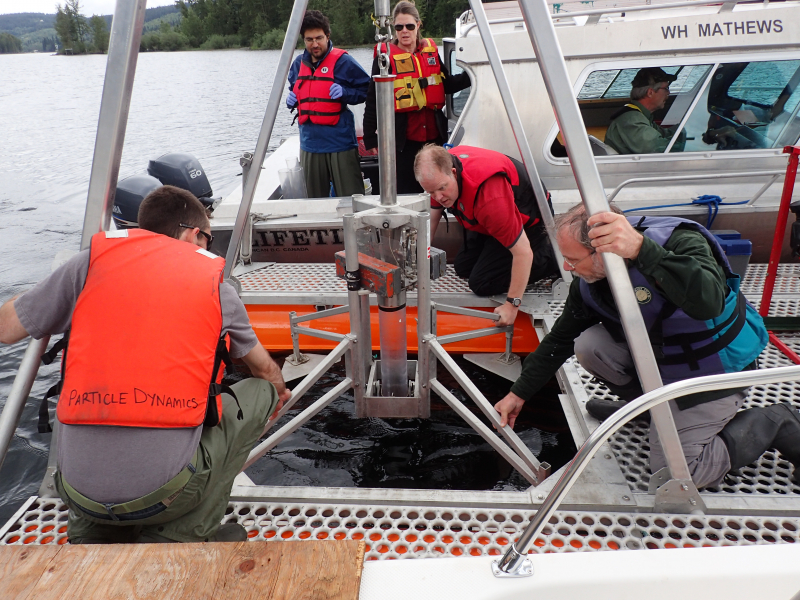Federal Funds Supporting Quesnel Lake Research
Prince George, BC – University of Northern British Columbia professors Dr. Ellen Petticrew and Dr. Phil Owens have secured nearly $800,000 in funding from the Government of Canada’s Environmental Damages Fund (EDF) to continue their research into the impacts on the Quesnel Lake ecosystem after the breach of the Mount Polley Mine tailings storage facility in 2014.
UNBC staff and students began a sampling and monitoring program within hours of the tailings pond breach on Aug. 4, 2014. Dr. Petticrew and Dr. Owens shared their initial findings with the public at the Dr. Max Blouw Quesnel River Research Centre’s Open House in October 2014. In May 2015 they published a paper in the journal Geophysical Research Letters which was co-authored with other Quesnel Lake researchers, many of whom are now collaborating in this project.
 Dr. Ellen Petticrew and Dr. Phil Owens
Dr. Ellen Petticrew and Dr. Phil Owens
With the use of EDF funds this summer, the research team brought in a specialized corer on loan from the Bedford Institute of Oceanography (Fisheries and Oceans Canada) in Halifax to collect samples of tailings and sediment at the bottom of the lake. The researchers are examining whether tailings deposited at the bottom of Quesnel Lake are loose and if they can re-enter the water column when the lake turns over seasonally.
“The group of researchers working on this project are assessing the linkages between the physical, chemical and biological impacts of the impoundment breach on Quesnel Lake,” says Dr. Petticrew. “Over the next three years we will be tracing the movement of tailings and sediment both within the water column and into the foodweb. Our scales of investigation range from full lake physical characterization to small scale measurements of metal bioavailability.”
The research team has continued a detailed monitoring program around the zone of initial deposition and in a halo around it extending out several kilometres. They have also monitored the quality of sediment below the lake in the Quesnel River. Dr. Petticrew and Dr. Owens will spend the fall and winter months examining the samples and will return to the field for more samples next spring and summer.
“The monitoring has demonstrated that the levels of some metals, such as copper, were still elevated in 2016, with pulses of contaminated sediment entering the Quesnel River that appear to be controlled by the physical behavior of the lake and hydrological conditions,” says Dr. Owens. “We anticipate that such conditions will continue for several years.”
Administered by Environment and Climate Change Canada, the Environmental Damages Fund is based on the polluter pays principle and ensures that court-awarded penalties for environmental violations are used to carry out projects that will restore or improve the environment. Funding for the Quesnel Lake project comes from a fine levied in 2014 related to a tailings pond breach in Northern Quebec.
“For more than two years UNBC researchers led by Dr. Ellen Petticrew and Dr. Phil Owens have been conducting intensive research efforts to determine the impacts of the tailings pond breach on the Quesnel Lake ecosystem. The substantial funding award from the Environmental Damages Fund will allow this important project to continue,” says UNBC President Dr. Daniel Weeks. “This work, conducted in collaboration with researchers at other institutions, is providing scientists and local residents with a better understanding of the post-spill environment. The findings will also be applicable to other similar aquatic ecosystems across the country and will help in mitigating the impacts of future mining incidents.”
The EDF funding will also fund the research of collaborators Dr. Susan Baldwin and Dr. Bernard Laval, both at the University of British Columbia, and Dr. Greg Pyle at the University of Lethbridge, in addition to Dr. Stephen Déry at UNBC. UNBC Research Associate Todd French has been hired to assist with the research through the EDF funds. In addition, several undergraduate and graduate students, and post-doctoral scientists will receive funding for their work through the grant.
This project was undertaken with the financial support of the Government of Canada.
Since the tailings pond breach, Dr. Petticrew and Dr. Owens’ work has also received funding from UNBC through the Office of Research and the College of Science and Management. The Province of British Columbia’s Ministry of the Environment has also provided in-kind support for analysis of samples.
-30-
Contact Information
Dr. Ellen Petticrew
Professor of Geography
Research Chair in Landscape Ecology
250-960-6645 | ellen.petticrew@unbc.ca
Peter James, Communications Officer
250-960-5420 | peter.james@unbc.ca
Dr. Phil Owens
Professor of Environmental Science
Research Chair in Landscape Ecology
250-960-6617 | philip.owens@unbc.ca

